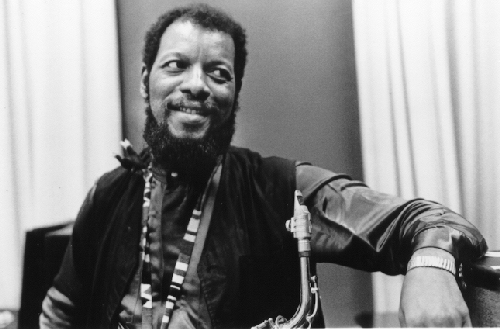![]()
![]()
![]()
![]()
![]()
“Alto player such as [Marion] Brown, [Prince] Lasha, [Jackie] McLean, (or, later, Henry Threadgill, Oliver Lake, Julius Hemphill, Tim Berne) tended to explore the perspectives of the liberated melodic line opened up by Coleman's example, while tenorists such as Albert Ayler, Pharaoh Sanders, Peter Brötzmann, Evan Parker, John Butcher, Mats Gustafsson focused on new timbrel dimensions...” - Peter Niklas Wilson
“Even those who belittle Ornette have partaken of his idea and discoveries, consciously of not.” - Dan Morgenstern
“Ornette has influenced almost every musician whose making any kind of contribution to the art form.” - Charlie Haden
John Coltrane, legendary tenor saxophonist
Coltrane is one of the most influential jazz musicians of all time, but Ornette had a definite influence on him. He may have even studied with Ornette regularly.
“Coltrane used to come hear us every night. He would grab Ornette by the arm as soon as we got off and they would go off into the night talking about music.” - Charlie Haden
Sonny Rollins, legendary tenor saxophonist
“[Sonny's] 1962 quartet included [trumpeter Don] Cherry and [drummer] Billy Higgins, and was clearly Coleman-inspired...” - Peter Niklas Wilson (Coleman Biographer)
Branford Marsalis, tenor saxophonist
Branford recorded Coleman's composition “Giggin'” on his 2002 album Footsteps of Our Fathers—the album was a tribute to some of his favorite musicians.
Jackie McLean, alto saxophonist
Jackie got his start playing bebop in the 40s and 50s, but he took a decidedly avant-garde turn once he heard Ornette music.
“His improvisation deals more with the sounds of voices speaking than of instruments singing.” - Jackie McLean
Art Pepper, alto saxophonist
This alto saxophonist was known for his light, airy tone and his association with cool jazz, but even he could not avoid Ornette's pervasive influence. He recorded Coleman's composition “Tears Inside” on his 1960 album Smack Up.
Phil Woods, alto saxophonist
Alto saxophonist Phil Woods' favorable opinion of Ornette is a bit of a surprise, as Woods was outspoken in his dislike of free jazz, specifically alto saxophonist Anthony Braxton. This defines the basic difference between Ornette's school of free jazz and the school of “energy” players, like Braxton. While Ornette's free was based solely on melodicism, the “energy” playing was centered mainly around textural contrast. Clearly, Woods preferred great melodies.
“Ornette's a definite master, a man who's taken tradition and moved the music along with quality and class all the time. I like Ornette's work very much. I always liked the way he played the saxophone, and he freed up the music; that's his contribution.” - Phil Woods
John Zorn, alto saxophonist/composer
Avante-gard saxophonist John Zorn recorded an album of seventeen Coleman tunes in 1988—Spy Vs. Spy: The Music Of Ornette Coleman.
Sonny Simmons, alto saxophonist
“...wore his passion for Coleman on his sleeve, as it were, in that he played a plastic saxophone after his hero's example.” - Peter Niklas Wilson
Modern Jazz Quartet - John Lewis, Milt Jackson, Percy Heath, and Connie Kay
The Modern Jazz Quartet were known for their fusion of jazz and classical music, but they were also early supporters of Ornette's music. They sponsored his attendance at the Lenox School of Jazz in 1960. Their 1960 album Lonely Woman featured Ornette's tune of the same name.
Bill Stevenson, punk rock drummer
In the 70s and 80s Stevenson played drums for innovative punk bands, like ALL, Black Flag, and The Descendants, but he lists some jazz artists, including Ornette, as influences.
“Before I started studying all of this African stuff, I'd been listening to massive amounts of jazz, with a particular slant towards the Charlie Parker/Dizzy Gillespie era of bebop and also Ornette Coleman's albums.” - Bill Stevenson
